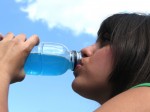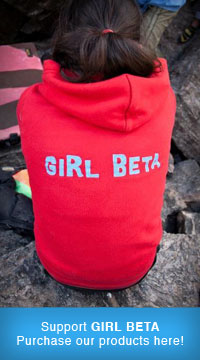The Importance of Hydration for Climbers
by Mercedes Pollmeier
In order to perform at the optimal level in climbing, your body needs to be well hydrated. Water is the basis of our body, about 45 to 70 percent of total body weight, depending on how much muscle mass you have. When our muscles and joints have the optimal amount of water, they can glide and move easily as we participate in our activities.
Water surrounding our muscles also provides the optimal environment for recovery. This is why creatine monohydrate supplementation is so helpful (though I don’t recommend it for most strength-to-body weight ratio sports/activities), because it draws water in and around the muscle tissue. With proper fluid amounts, cellular functions operate at a more efficient pace and allows for wastes and toxins to be flushed out of the cell. If you are dehydrated, you may notice faster muscle fatigue, reduced coordination and muscular cramping.
As a climber, I always found it difficult to stay properly hydrated in the cold and on long approaches. Firstly, no one wants to hike in the extra weight of water, this is why having a purifier is handy, but only if there is a water source near by your crag. Another problem I have encountered with many boulderers and climbers is that drinking water adds body weight, which seems detrimental while trying to crush your problem or route. While this is quite true, it may only add a few ounces at a time as you drink and regularly go to the bathroom. Remember, keeping hydrated while climbing is beneficial for performance on your project and helps with speed of recovery, repairing your muscles and getting them ready for your next training or climbing session.
Tips on staying hydrated: try to take a few sips after every burn and eat fruit while you climb. You don’t only get water from drinking it, you also get it from your foods, specifically fruits and vegetables. There’s another reason to eat your veggies daily! Try to avoid fluids with sugar in them, as this can reverse the hydration process, and this also prevents you from drinking your calories, which, when trying to lose weight, can keep you from reaching your goal weight. About 4 hours before activity you should drink 2 to 3 milliliters per pound of body weight to get your body ready and in proper water balance (“Nancy Clark’s Sports Nutrition Guidebook”; Nancy Clark, MS, RD; 2008).
Some symptoms of dehydration: headaches similar to what is experienced during a hangover, decreased blood pressure (hypotension), and dizziness or fainting when standing up due to orthostatic hypotension. One’s heart and respiration rates begin to increase to compensate for decreased plasma volume and blood pressure, while body temperature may rise because of decreased sweating (Wikipedia, 2012).
This entry was posted on Wednesday, August 29th, 2012 at 2:40 am and is filed under Articles. You can follow any responses to this entry through the RSS 2.0 feed. You can leave a response, or trackback from your own site.
Leave a Reply
You must be logged in to post a comment.
Analytics Plugin made by VLC Media Player





